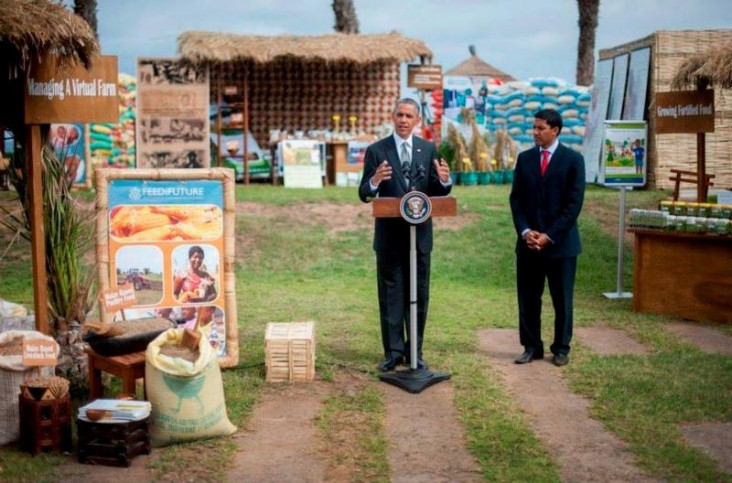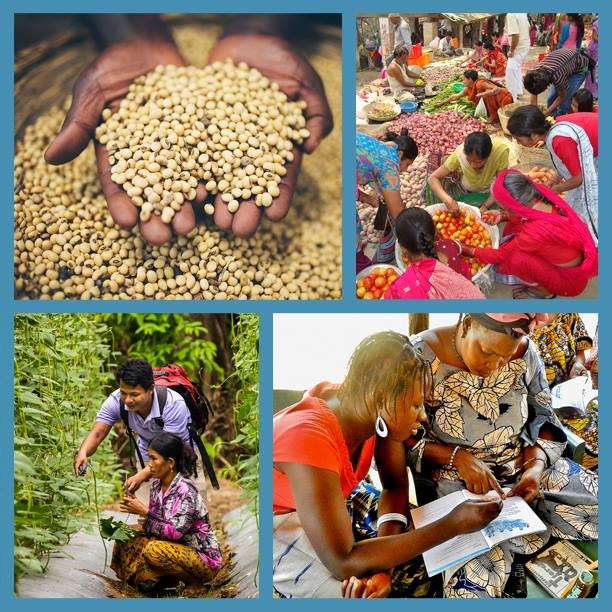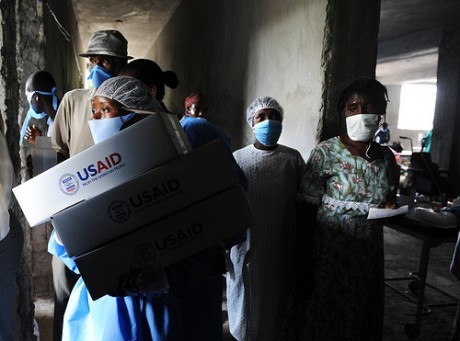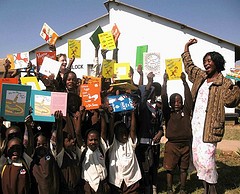
Volume Four, Issue Thirteen
Administrator Shah Travels with President Obama to Africa

A New Partnership with Africa
President Barack Obama and the first family visited three African countries last week highlighting the shifting paradigm in the United States' partnership with Africans. With Africans as architects of their own development the partnership will increase trade and investment, strengthen democratic institutions, invest in young people and renew a more robust engagement with our African partners.
USAID is proud of the new and innovative ways we work with the continent to build a peaceful and prosperous future. Sub-Saharan Africa is making steady progress toward ending extreme poverty, fueled by robust economic growth, better governance, and service delivery in many countries.
These gains have been supported by the U.S. Government's investments in improved agriculture, health care and democratic institutions, and our increased focus on women and a new generation of African thinkers, entrepreneurs, and innovators, each of which are delivering transformational results. In concert with partners throughout Africa, we are working toward ending extreme poverty and providing millions with a foothold in the global economy-and helping to realize the promise of the world's most youthful region.
On July 9, USAID Administrator Rajiv Shah joined the Center for Global Development's president, Nancy Birdsall, for a conversation on U.S. Partnership with Africa reflecting on his trip and answering questions from the audience.
For a recap of the event, watch the video. On July 11, Administrator Shah participated in a LiveAtState virtual press conference where we talked about his trip to Africa and several key initiatives that were the focus of the trip, including Power Africa, the Young African Leaders Initiative, Feed the Future, and the New Alliance for Food Security. Video will be posted soon on LiveatState.
It Starts with the Youth in Africa
While visiting South Africa, President Obama announced the Washington Fellowship for Young African Leaders, a new flagship program of the President's Young African Leaders initiative (YALI). YALI was launched in 2010 to support young African leaders as they work to spur growth and prosperity, strengthen democratic governance and enhance peace and security across the continent.
This new Fellowship will bring 500 young African leaders each year to U.S. universities for world-class training in business, leadership and public administration. With the support of private- and public-sector partners, Washington Fellows will have access to exceptional opportunities including internships and small grants to start businesses, establish or expand NGOs, or undertake projects to improve their communities.
Investing in the next generation of African leaders is critical to ensuring the success of Africa's democracies and its economies. One in three Africans is between the ages of 10 and 24, and around 60 percent of Africa's total population is below 35. Through YALI, we are committed to enhancing leadership skills, bolstering entrepreneurship, and connecting young African leaders with one another, with the United States, and with the American people.
- WATCH: The President's Announcement
- LEARN MORE: How USAID is involved
Powering Africa: Clean and Renewable Energy
In South Africa, the President launched Power Africa - a new initiative led by USAID to mobilize investment in clean and renewable energy-and stressed the importance of private sector engagement to facilitate trade and open new markets. The launch of Power Africa caps months of preparation and follows the establishment of partnerships with host country governments and the private sector. So far 35 private sector partners have committed more than $14 billion to projects in six African countries -- Liberia, Ghana, Nigeria, Ethiopia, Kenya, and Tanzania. U.S. Government agencies have committed more than $7 billion in financial support.
One unique aspect of Power Africa is that it will be directed from the field. Initiative Coordinator Andrew Herscowitz will be based in the USAID Mission in Nairobi, and transaction advisors in each of the Power Africa countries will work with host governments in identifying and helping to overcome obstacles to completing power projects. "We'll expand access for those who currently live off the power grid, and we'll support clean energy to protect our planet and to combat climate change," President Obama said. At present, more than two-thirds of sub-Saharan African lack access to electricity.
Learn More:
- POWER AFRICA: Access to electrical power in sub-Saharan Africa
- INFOGRAPHIC: Energy for Africa
- READ: The President's Announcement
- READ: Details about Power Africa
Trade Africa: A Plan for Economic Growth
While in Tanzania, President Obama also launched Trade Africa , an initiative that unites U.S. Government trade efforts to support trade within Africa, and expand trade and economic ties between Africa, the United States and other global markets.
Trade Africa will initially focus on the member states of the East African Community but aims to expand its collaboration with other regional economic communities in Africa. The initiative seeks to increase EAC exports to the United States by 40 percent and significantly reduce border and port transit times to ease the movement of goods and services. USAID's three regional Trade Hubs will be expanded into Trade and Investment Centers.
Learn More:
Feed the Future Report Launch

While In Senegal, President Obama announced the release of the 2013 Feed the Future progress report highlighting some of the impressive results being made through U.S. Government global food security efforts. In 19 focus countries worldwide, Feed the Future has:
-
Helped over 7 million food producers adopt improved agricultural technologies or practices
- Brought nearly 4 million hectares of land under improved cultivation and management practices
- Helped increase the value of exports of targeted commodities by $84 million
- Forged over 660 public-private partnerships to improve food security locally and globally
- Increased the value of agricultural and rural loans by more than $150 million
Several other food security advancements were highlighted during President Obama's visit, including Senegal's intent to join the G8's New Alliance for Food Security and Nutrition. The President also announced a new partnership with the Alliance for a Green Revolution in Africa that will help governments strengthen their seed sectors and promote other key agricultural technologies crucial to the New Alliance goal of helping lift 50 million sub-Saharan Africans out of poverty by 2022.
Join the Conversation:
-
TWEET @USAID or @FeedtheFuture to share how you will help #FeedtheFuture
-
READ the Feed the Future Report and Scorecard
-
SHARE the White House Fact Sheet
- WATCH the Video of President Obama speaking at Agriculture Marketplace
Agency Steps Up Cholera Fight

The Agency is joining other coalition members -- including the Pan American Health Organization/World Health Organization (PAHO/WHO), the Centers for Disease Control and Prevention and UNICEF -- in pledging support to the Government of Haiti as it works to eliminate cholera from the island of Hispaniola.
"USAID is proud to join this coalition and will continue our efforts to end cholera in Hispaniola," said Beth Hogan, USAID's acting assistant administrator for Latin America and the Caribbean, at the signing of a declaration at PAHO/WHO in Washington, D.C. "We provide access to health care to approximately half of the Haitian population and will continue critical services such as prevention and treatment of diarrheal diseases, including cholera, and education on hygiene issues as part of this effort."
Read more about USAID's efforts to eliminate cholera in Haiti.
Career Openings at USAID
Want To Work for USAID? Check out our current vacancy announcements!
Contract Specialist
GS-1102-09/13
Closes Monday, September 30, 2013
IT Specialist (InfoSec)
GS-2210-9/11
Closes Saturday, February 15, 2014
USAID In the News

A publication in the Middle East's AmeInfo wrote of a dialogue hosted by USAID's Youth for Future Project. This session showcased success stories and firsthand experiences from several Youth Entrepreneurship Project beneficiaries, and concluded with a Q&A segment and the dissemination of the final report on the Project.
The New York Times mentioned "a new loan-guarantee program by [USAID] intended to generate...$100 million in private financing to develop clean-energy technologies" in a piece on President Obama's speech on climate change at Georgetown University in late June. Secretary of State John Kerry made the announcement during a recent visit to New Delhi. "The good news is that if we do this right, it's not going to hurt our economies," Mr. Kerry said. "It actually helps them. It won't deny our children opportunity; it will actually create new ones."
The Post Zambia reported that Zambia and USAID are working together to improve literacy among the nation's young. This collaboration recently launched "Reading Tools in a Box," a collection of low-cost reading materials to improve early grade literacy. The box is said to help learners develop important reading skills.
An article in Federal Computer Week reports on a rolling contest sponsored by USAID and Humanity United. The Tech Challenge for Atrocity Prevention contest, encourages innovative and technology-driven solutions for international aid. The latest batch of winners was announced on July 10th. The first place winner in the communication category created a "Smartphone software that keeps communication intact in the face of infrastructure damage."
Have you Seen our Blog?
Check out the Impact Blog to stay updated on the latest information about USAID programs in Washington and around the world. Read stories from the field, hear from development experts, and view weekly photos and videos of development in action. You can also join the conversation on social media!








Comment
Make a general inquiry or suggest an improvement.